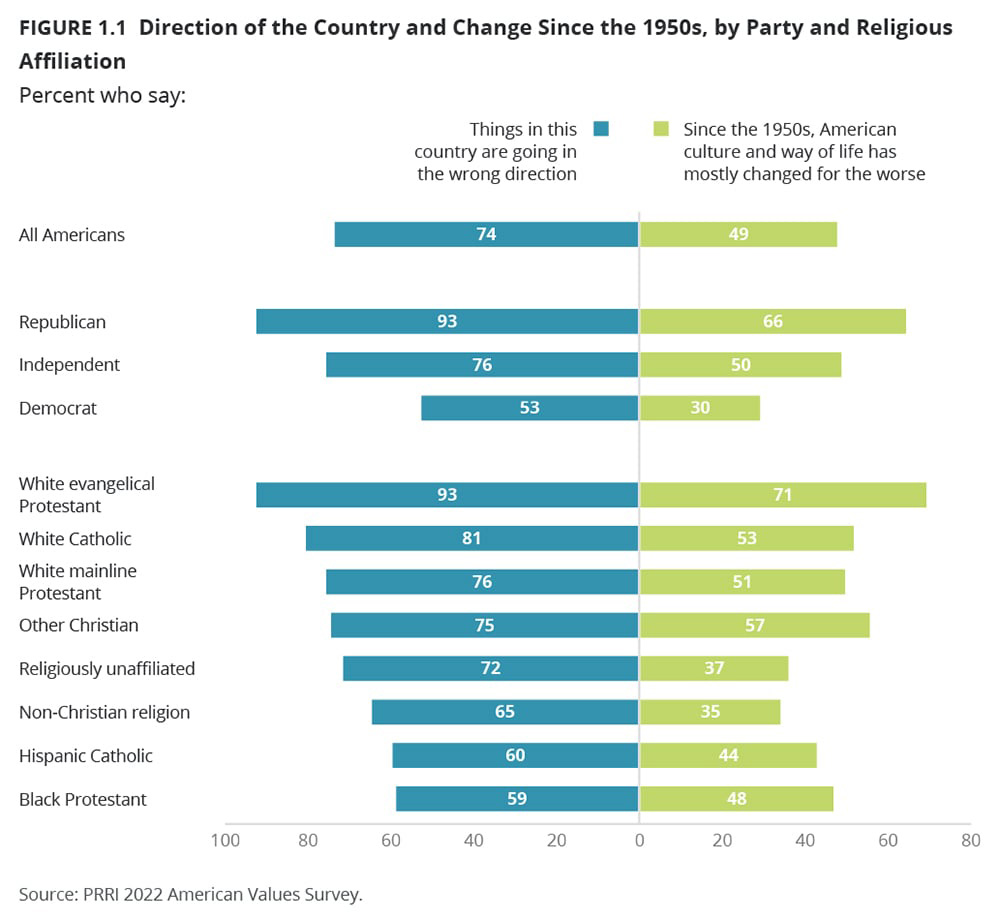Faith groups say US gone astray, disagree about how
WASHINGTON (RNS)—Three-quarters of Americans say the country is heading in the wrong direction, and the majority of many religious groups agree with that sentiment, a new report shows. But they don’t all agree on what, exactly, has gone wrong.
The 2022 American Values Survey by Public Religion Research Institute finds religious Americans hold generally negative views of the state of the country, ranging from 93 percent of white evangelical Protestants to 59 percent of Black Protestants.
“Though most Americans favor moving forward, a sizable minority yearn for a country reminiscent of the 1950s, embrace the idea that God created America to be a new promised land for European Christians, view newcomers as a threat to American culture, and believe that society has become too soft and feminine,” the 60-page report states.
“This minority is composed primarily of self-identified Republicans, white evangelical Protestants, and white Americans without a college degree.”
 PRRI President Robert P. Jones, who discussed the survey Oct. 27 at Washington’s Brookings Institution, said the results are striking to him despite his spending years studying U.S. cultural and political patterns.
PRRI President Robert P. Jones, who discussed the survey Oct. 27 at Washington’s Brookings Institution, said the results are striking to him despite his spending years studying U.S. cultural and political patterns.
“I’m still continually struck by how by party, by race, by religion, we are in many ways factions and worlds apart,” he said. “We have the two political parties, essentially, defending different histories, living in different realities, and even promoting two essentially incompatible views of America’s future.”
PRRI’s survey addressed questions of race, sexuality, abortion and immigration, as well as sentiments about the country’s origins.
About a third (31 percent) of Americans agree with the statement: “God intended America to be a new promised land where European Christians could create a society that could be an example to the rest of the world.”
Those surveyed who said they believe God intended America to be a new promised land for European Christians are more than twice as likely as those who disagree to say true American patriots may have to resort to violence (32 percent vs. 14 percent).
Half of white evangelical Protestants agree, while smaller percentages of other religious groups do: 37 percent of white mainline Protestants, 36 percent of white Catholics, 32 percent of Hispanic Catholics, 22 percent of Black Protestants and non-Christian religious Americans and 16 percent of the religiously unaffiliated.
Americans are split about whether immigrants to the United States are a threatening (40 percent) or a strengthening factor for society (55 percent), with white Christian subgroups significantly more likely than others in the country to side with the idea that newcomers from other countries are a threat.
White evangelical Protestants, at 51 percent, are the only faith group where a majority say immigrants are “invading our country and replacing our cultural and ethnic background.”
By far among religious groups, white evangelical Protestants (61 percent) also agree “society as a whole has become too soft and feminine.” Americans in general are split on this notion, with 42 percent agreeing and 53 percent disagreeing.
The survey found the Supreme Court’s ruling in Dobbs v. Jackson Women’s Health Organization decision is a significant motivator to vote in the midterm elections. That ruling overturned Roe v. Wade, which in 1973 determined abortion was a constitutional right.
Some 50 percent of white evangelical Protestants, Black Protestants and white Catholics said they were more likely to vote after the ruling in June, as did 48 percent of religiously unaffiliated Americans, 47 percent of non-Christian religious Americans and 45 percent of white mainline Protestants.
A distinct minority across the board—from 35 percent of white evangelicals to 9 percent of the religiously unaffiliated—support laws that would make it illegal to cross state lines to obtain an abortion in a state where the procedure is permitted.
People with different religious affiliations varied in what they considered top priorities for midterm voting, but majorities of many faith categories cited “the health of our democracy” as being critical to their vote.
A majority of Americans planning to head to the polls (57 percent) listed the health of our democracy and increasing costs of housing and other everyday expenses as critical issues for their vote.
The research found disparate views among religious Americans about racial and LGBTQ issues.
Asked if “generations of slavery and discrimination have created conditions that make it difficult for Black Americans to work their way out of the lower class,” white Christians were significantly less likely to agree, while majorities of Black Protestants, religiously unaffiliated Americans, non-Christian religious Americans and Hispanic Catholics agreed.
Most white evangelical Protestants, Black Protestants, other Christians, white Catholics and white mainline Protestants say there are only two genders (female and male), compared with smaller percentages of Hispanic Catholics, religiously unaffiliated Americans and religious non-Christians.
The survey was based on a representative sample of 2,523 adults in all 50 U.S. states and was conducted online from Sept 1-11. It has an overall margin of error of plus or minus 2.3 percentage points.